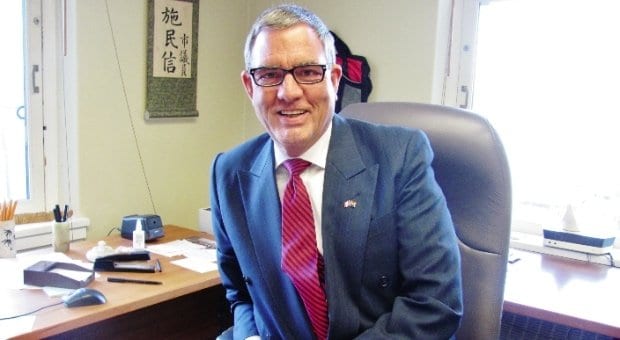Letters have been sent and meeting plans are underway in preparation for gay Vancouver Councillor Tim Stevenson to travel to Russia Jan 28 to lobby for gay rights and inclusion in future Olympic Games.
Since Jan 1, the City of Vancouver has sent approximately 75 letters to members of the International Olympic Committee (IOC), the Canadian Olympic Committee, the Russian Olympic Committee and various Russian civic groups, requesting that officials meet with Stevenson to discuss gay rights while he is in Sochi, Feb 1 to 9.
Representing Vancouver as deputy mayor of a former Olympic host city, Stevenson, accompanied by project manager Maureen Douglas, will travel to Sochi to lobby the IOC to change its charter to explicitly include sexual orientation in its anti-discrimination clause. Vancouver City Council unanimously endorsed the initiative on Dec 18.
Stevenson will also lobby the IOC to make Pride Houses part of city bids for all future Olympic Games. Although no official meetings have been scheduled in Sochi, the city has received positive responses, Stevenson says.
“It looks promising. They are asking for dates that we’ll be there, and we’re in the middle of those discussions right now,” he says. “It’s still early to tell, but all indication is that they’re aware that we’re coming and they’re aware that we want to meet with them.”
Stevenson hopes to meet with two or three IOC members each day. He has also requested meetings with members of the Russian government, gay groups and religious leaders.
“The Russian Orthodox Church is very influential. I’d like to tell them how I feel and that I know we disagree, but this is how I feel as a Christian,” says Stevenson, who is an ordained United Church minister.
“Our role in Sochi is to advocate and educate,” Douglas explains.
“We’ve gone to a lot of nations that tend to be more inclusive of the gay community, and if we can get them on board to create advocacy within the Olympic sport community, that will help as well,” she says. “We want to build momentum to lobby the IOC so this initiative can pass through more quickly.”
“It is going to happen, but we don’t expect it to happen in Sochi,” she says. “But I would be thrilled if all this is settled by the next 2016 Games, in Rio.”
Russian officials in Vancouver seem to be backing the mission. “We’ve had meetings with the Russian consul here in Vancouver, and they’ve said that they would be happy to help arrange meetings in Russia,” Stevenson says.
Artem Tcherkassov, the honorary consul of the Russian Federation, could not be reached, but a press release on the consul’s website states that he met with Stevenson on Dec 19 and “discussed Vancouver’s concerns about LGBTQ rights in Russia and the mission to Sochi to advocate for Pride Houses and the inclusion of the LGBTQ community at the future Olympic and Paralympic Games.”
The statement says Tcherkassov “expressed gratitude for Vancouver sending a delegation as the most recent Winter Olympics Host City, and offered to provide logistical assistance where possible to Vancouver’s representatives.”
“This has been a huge undertaking,” Stevenson says of the planning process. “I feel like I have a tiger by the tail.”
Pride House co-founder Dean Nelson was originally supposed to accompany the mission but had to back out because of a conflicting work commitment. He says he’s proud of the legacy created by Vancouver’s 2010 Olympic Pride House.
“In 2010, we started the conversation,” he says. “We dared to talk about homophobia in sport, and the 2012 [London Games] picked up the torch and ran with it. Sochi is just another step evaluating what we need to do to enshrine these rights globally.”
“To me, it’s been so gratifying to see so many people who feel this is so important that they’ve literally thrown themselves in and have put in hours and weeks of work to bring this [initiative] about,” Stevenson says.
Stevenson initially didn’t want to use city funds for the mission, but council voted to cover his Sochi expenses. He says he doesn’t know the exact budget for the trip but promises that “all of it will be transparent.”
A Jan 21 email sent to Xtra by city manager Penny Ballem estimates that Stevenson’s trip expenses will total approximately $8,000. Douglas’s expenses, also estimated at $8,000, will be covered through fundraising efforts and private donors. Douglas’s contract wage, which Ballem would not disclose, will also be covered by private donation.
To date, $50,000 has been raised through corporate donations. Stevenson says any donated funds remaining from the trip will go to further IOC lobbying and to support Russia’s LGBT community.
“I don’t expect the IOC to see me and say right away, ‘Yes, we’re changing the charter; yes, we’re going to have a Pride House,’ he says. “However, having the meetings will be a tremendous step to put forward the case of needing sexual orientation included in the charter.”
Asked if he’s concerned for his safety, Stevenson says he would be “foolish not to be concerned in light of recent reports of suspected terrorism during the Games. Every tourist going, every Olympic athlete, every press person is possibly in danger. So I’m in no more danger than that, I don’t think,” he says. “There’s danger in life everywhere.”
The risk won’t deter him, he says. “I feel quite compelled to see this through because it has to be done . . . because I’m a gay man and this injustice has to be faced.”
Sochi mission send-off
Mon, Jan 27, 7pm
Fountainhead Pub, 1025 Davie St

 Why you can trust Xtra
Why you can trust Xtra


